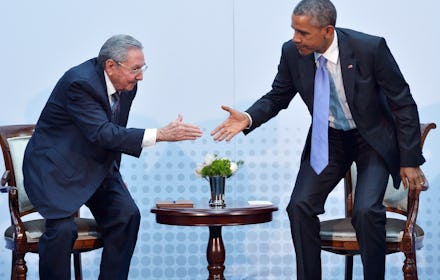The U.S. Just Took Cuba Off Its State Sponsor of Terrorism Blacklist

On Friday, the Obama administration removed Cuba from the federal government's list of state sponsors of terrorism, another major step toward ending more than 50 years of diplomatic strife and restrictions on travel and commerce between the two nations.
"While the United States has significant concerns and disagreements with a wide range of Cuba's policies and actions, these fall outside the criteria relevant to the rescission of a State Sponsor of Terrorism designation," the State Department said in a statement.
Friday's decision, which follows a 45-day waiting period set in motion by Secretary of State John Kerry, clears the way for the building of embassies and tearing down of barriers to international trade. Any move to lift the more cumbersome sanctions on the government in Havana would need approval from Congress. With Republicans controlling both chambers, that is unlikely to occur in the near future.
"Most U.S. sanctions on the Cuban regime are contained in other laws – laws the U.S. House will ensure remain in place as we work to protect those fighting for freedom, and in many cases, simply their own survival," House Speaker John Boehner (R-Ohio) said in a statement following the announcement.
Long road: Cuba and the U.S. have been at odds, and Havana isolated from much of the world community, since former President Fidel Castro deposed U.S.-backed dictator Fulgencio Batista in 1959. Castro ruled for 49 years before turning over power to his brother, Raúl.
This recent thaw began in late December 2014, when President Barack Obama unveiled the framework for plans to normalize relations between the countries. At that time, the U.S. and Cuba also agreed on a prisoner swap that brought home Alan Gross, an American who had been imprisoned in Cuba for more than two decades.
Back in 2009, Obama used his executive authority to grant families greater freedom to visit and send money to loved ones on the island. He also removed restrictions on telecommunication companies looking get a toehold in the mostly untapped market.
What it means for 2016: The decision is likely to strike up debate inside the 2016 Republican presidential race. Marco Rubio, a Cuban-American senator from Florida, has been a vocal critic of the administration's attempts at detente with the Castro government.
"This president is the single worst negotiator we have had in the White House in my lifetime," Rubio said at a news conference after the December deal was announced, describing the administration as "not just naive, but willfully ignorant of the way the world truly works."
His remarks caught the eye of Sen. Rand Paul, now Rubio's rival in the GOP nominating contest, who dismissed his colleague as an "isolationist" in offering his support to the administration.
"Peace through commerce is one of Senator Paul's firm beliefs," a Paul spokesman told the Daily Beast at the time.
It is also, as evidenced by Friday's announcement, deeply rooted in Obama's foreign policy strategy. The White House is betting that by opening up business and travel to Cuba, the Cuban government will be forced loosen its authoritarian grip on the nation.